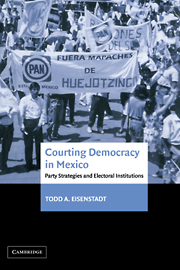Book contents
- Frontmatter
- Contents
- Figures and Tables
- Acknowledgments
- Courting Democracy in Mexico
- 1 Electoral Courts and Actor Compliance: Opposition-Authoritarian Relations and Protracted Transitions
- 2 Ties That Bind and Even Constrict: Why Authoritarians Tolerate Electoral Reforms
- 3 Mexico's National Electoral Justice Success: From Oxymoron to Legal Norm in Just over a Decade
- 4 Mexico's Local Electoral Justice Failures: Gubernatorial (S)Election Beyond the Shadows of the Law
- 5 The Gap Between Law and Practice: Institutional Failure and Opposition Success in Postelectoral Conflicts, 1989–2000
- 6 The National Action Party: Dilemmas of Rightist Oppositions Defined by Authoritarian Collusion
- 7 The Party of the Democratic Revolution: From Postelectoral Movements to Electoral Competitors
- 8 Dedazo from the Center to Finger Pointing from the Periphery: PRI Hard-Liners Challenge Mexico's Electoral Institutions
- 9 A Quarter Century of “Mexicanization”: Lessons from a Protracted Transition
- Appendix A Coding the Postelectoral Conflict Dependent Variable
- Appendix B Coding of Independent Variables
- Bibliography
- Index
8 - Dedazo from the Center to Finger Pointing from the Periphery: PRI Hard-Liners Challenge Mexico's Electoral Institutions
Published online by Cambridge University Press: 22 September 2009
- Frontmatter
- Contents
- Figures and Tables
- Acknowledgments
- Courting Democracy in Mexico
- 1 Electoral Courts and Actor Compliance: Opposition-Authoritarian Relations and Protracted Transitions
- 2 Ties That Bind and Even Constrict: Why Authoritarians Tolerate Electoral Reforms
- 3 Mexico's National Electoral Justice Success: From Oxymoron to Legal Norm in Just over a Decade
- 4 Mexico's Local Electoral Justice Failures: Gubernatorial (S)Election Beyond the Shadows of the Law
- 5 The Gap Between Law and Practice: Institutional Failure and Opposition Success in Postelectoral Conflicts, 1989–2000
- 6 The National Action Party: Dilemmas of Rightist Oppositions Defined by Authoritarian Collusion
- 7 The Party of the Democratic Revolution: From Postelectoral Movements to Electoral Competitors
- 8 Dedazo from the Center to Finger Pointing from the Periphery: PRI Hard-Liners Challenge Mexico's Electoral Institutions
- 9 A Quarter Century of “Mexicanization”: Lessons from a Protracted Transition
- Appendix A Coding the Postelectoral Conflict Dependent Variable
- Appendix B Coding of Independent Variables
- Bibliography
- Index
Summary
We came in by bullets and will not be removed by votes.
Fidel Velázquez (PRI labor head from 1949 until 1997) (cited in del Collado 2000, 271)It was the best case scenario from the National Action Party's (PAN) hypothetical concertacesión playbook. The sitting Party of the Institutional Revolution (PRI) president congratulates the PAN challenger on the very night of the election, preempting any need to press their postelectoral case through the courts or in the streets. While Vicente Fox's defense of the vote team and the PAN relished their victory and reveled in the fact that they would not have to engage in their usual three-day postelectoral complaint-filing marathons, the PRIístas were not so pleased with Zedillo's announcement. Rumors circulated in the days after the election that Zedillo had betrayed his party for a place in history as Mexico's great democratizer. And while being a gracious loser may have been part of Zedillo's bid to be the hero of courting democracy in Mexico, it was viewed as disloyal by a party that held power for generations precisely by valuing loyalty as the highest trait.
If the PRI bureaucracy's immediate response to Zedillo's recognition of Fox was simmering contempt, it boiled over in the following months in a PRI-on-PRI postelectoral conflict in Mexico State claiming dozens of lives and in protests by outgoing governors in Tabasco and Yucatán against the federal electoral court's unprecedented interventions in state elections.
- Type
- Chapter
- Information
- Courting Democracy in MexicoParty Strategies and Electoral Institutions, pp. 234 - 269Publisher: Cambridge University PressPrint publication year: 2003



